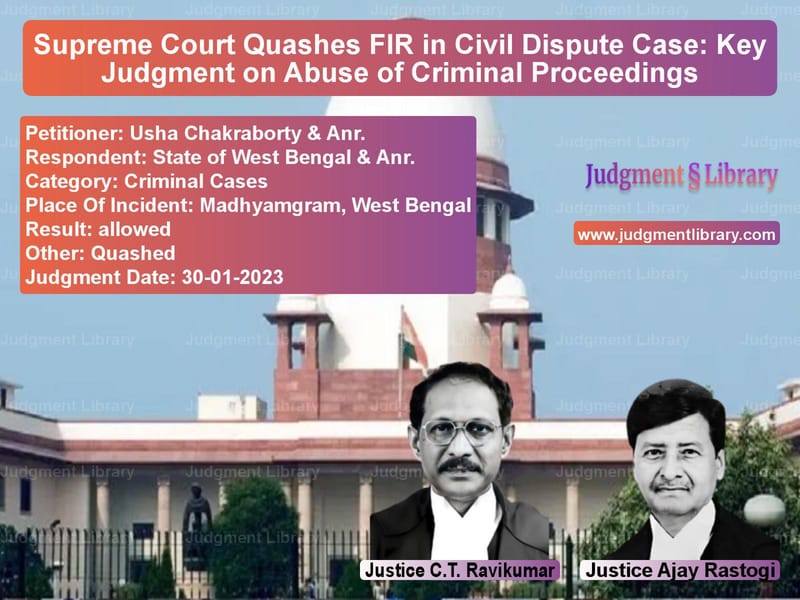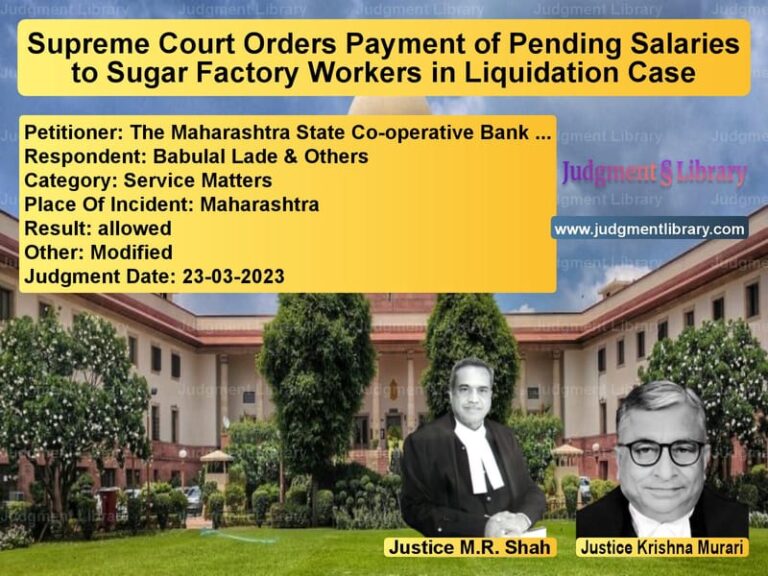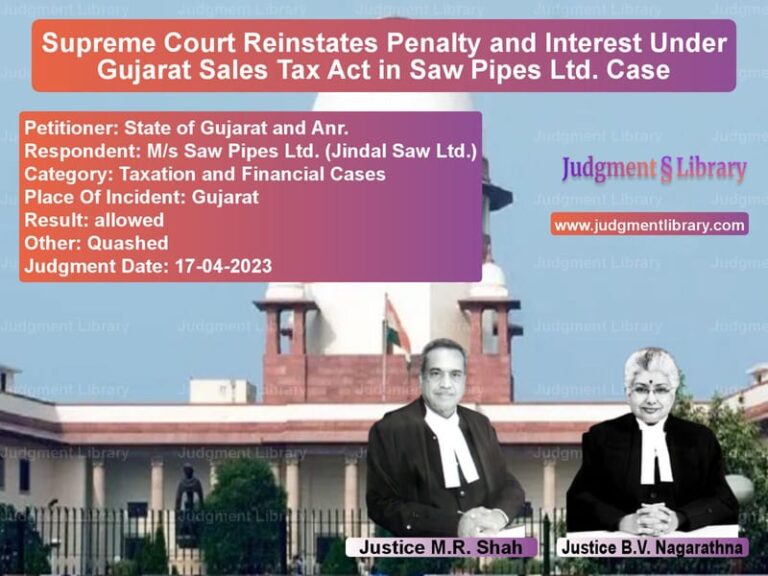Supreme Court Quashes FIR in Civil Dispute Case: Key Judgment on Abuse of Criminal Proceedings
The case of Usha Chakraborty & Anr. v. State of West Bengal & Anr. revolves around the misuse of criminal proceedings in what was essentially a civil dispute. The Supreme Court quashed the FIR against the appellants, reinforcing the principle that criminal law should not be used as a tool for harassment when a civil remedy is available.
Background of the Case
The dispute originated from a conflict regarding the management of a school run by Bagla Sundari Memorial Trust in Madhyamgram, West Bengal. The complainant, Jayanta Banerjee, alleged that the appellants, Usha Chakraborty and Ashoka Chakraborty, had fraudulently altered the trust deed, removed him from the post of Secretary, and misappropriated funds.
Banerjee had already filed a civil suit (Title Suit No. 363/2015) in the First Civil Judge Court at Barasat, seeking a declaration that he was the rightful Secretary of the managing committee. However, after failing to secure a favorable order in the civil case, he approached the Magistrate under Section 156(3) of the Code of Criminal Procedure (Cr.P.C.), leading to the registration of an FIR on April 11, 2017.
The FIR was lodged under multiple sections of the Indian Penal Code (IPC), including:
- Section 323 (Voluntarily causing hurt)
- Section 384 (Extortion)
- Section 406 (Criminal breach of trust)
- Section 423 (Dishonest or fraudulent execution of a deed)
- Section 467 (Forgery of valuable security)
- Section 468 (Forgery for the purpose of cheating)
- Section 420 (Cheating and dishonestly inducing delivery of property)
- Section 120B (Criminal conspiracy)
The appellants moved the Calcutta High Court under Section 482 Cr.P.C. to quash the FIR, arguing that the allegations were baseless and the matter was purely civil. The High Court dismissed their plea on May 17, 2022, stating that there was prima facie evidence warranting an investigation. Aggrieved by this decision, they approached the Supreme Court.
Key Legal Issues
1. Can Criminal Proceedings Be Initiated in a Civil Dispute?
The Supreme Court reiterated that criminal law cannot be used as a substitute for civil litigation. It cited Paramjeet Batra v. State of Uttarakhand, emphasizing that:
“If a dispute is essentially of a civil nature, the High Court should not hesitate to quash criminal proceedings to prevent abuse of the process of law.”
2. Was the FIR an Abuse of Process?
The Supreme Court found that the complainant had suppressed material facts:
- He had already challenged his removal in a civil court.
- The civil court had not granted him any interim relief.
- Despite this, he filed a criminal complaint with similar allegations.
The Court ruled that filing a criminal case after failing in civil proceedings amounted to an attempt to pressurize the accused.
3. Were the Allegations Sufficient to Warrant Criminal Proceedings?
The Court examined the essential ingredients of the offenses alleged and found that:
- No prima facie case was made out for extortion (Section 384 IPC).
- There was no evidence of dishonest misappropriation (Section 406 IPC).
- The allegations of forgery (Sections 467 and 468 IPC) were vague and lacked specifics.
The Court emphasized that mere allegations without substantive proof do not warrant criminal prosecution.
Supreme Court’s Judgment
The Supreme Court ruled in favor of the appellants, stating:
“Permitting the continuance of the criminal proceedings in the given facts would result in abuse of process of law and miscarriage of justice.”
Accordingly, it quashed FIR No. 189/2017 and all further proceedings against the appellants.
Implications of the Judgment
The ruling sets an important precedent for preventing the misuse of criminal law in civil disputes:
- Protection Against Harassment: The judgment prevents litigants from using criminal cases as a pressure tactic in property and trust disputes.
- Clarity on Section 482 Cr.P.C.: It reaffirms that High Courts must quash frivolous criminal cases that lack a genuine criminal element.
- Separation of Civil and Criminal Law: The ruling reinforces that criminal law should not be used when an adequate civil remedy exists.
Conclusion
The Supreme Court’s decision in Usha Chakraborty & Anr. v. State of West Bengal & Anr. underscores the principle that criminal proceedings should not be allowed to continue when they are evidently being misused to settle civil disputes. This ruling will serve as a critical reference in future cases where criminal law is wrongly invoked in matters that are purely civil in nature.
Read also: https://judgmentlibrary.com/murder-conviction-upheld-supreme-court-ruling-in-john-anthonisamy-case/
Petitioner Name: Usha Chakraborty & Anr..Respondent Name: State of West Bengal & Anr..Judgment By: Justice C.T. Ravikumar, Justice Ajay Rastogi.Place Of Incident: Madhyamgram, West Bengal.Judgment Date: 30-01-2023.
Don’t miss out on the full details! Download the complete judgment in PDF format below and gain valuable insights instantly!
Download Judgment: usha-chakraborty-&-a-vs-state-of-west-bengal-supreme-court-of-india-judgment-dated-30-01-2023.pdf
Directly Download Judgment: Directly download this Judgment
See all petitions in Fraud and Forgery
See all petitions in Bail and Anticipatory Bail
See all petitions in Legal Malpractice
See all petitions in Extortion and Blackmail
See all petitions in Judgment by C.T. Ravikumar
See all petitions in Judgment by Ajay Rastogi
See all petitions in allowed
See all petitions in Quashed
See all petitions in supreme court of India judgments January 2023
See all petitions in 2023 judgments
See all posts in Criminal Cases Category
See all allowed petitions in Criminal Cases Category
See all Dismissed petitions in Criminal Cases Category
See all partially allowed petitions in Criminal Cases Category







